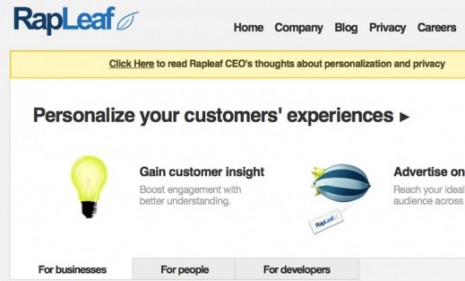What is RapLeaf ... and why does it know your name?
The online tracking startup knows a lot about you, and it is selling the information to advertisers and political campaigns. Should you care?

A free daily email with the biggest news stories of the day – and the best features from TheWeek.com
You are now subscribed
Your newsletter sign-up was successful
The Silicon Valley startup RapLeaf began life as a user-generated online "trust meter," but now is better known as a "creepy," privacy-invading miner and purveyor of internet users' personal details. Its reputation took a beating recently after reports that it had sent advertisers information that could have been used to identify some Facebook and MySpace users. According to a Wall Street Journal profile, the company has a billion email addresses in its database and probably knows a lot about you. Is RapLeaf evil, or is it getting a bad rap? (Watch RapLeaf's founder discuss the company)
What does RapLeaf do?
It compiles "extraordinarily intimate databases on people" by tracking their online activity, matching their internet presence and email address to their real name, and then pulling in information from "voter-registration files, shopping histories, social-networking activities, and real estate records, among other things," The Journal reports. It then sells some of that information.
The Week
Escape your echo chamber. Get the facts behind the news, plus analysis from multiple perspectives.

Sign up for The Week's Free Newsletters
From our morning news briefing to a weekly Good News Newsletter, get the best of The Week delivered directly to your inbox.
From our morning news briefing to a weekly Good News Newsletter, get the best of The Week delivered directly to your inbox.
Is that unusual?
Not the online tracking part — but tying everything together with your name and email address makes RapLeaf "a rare breed," says the Journal. By which "we mean 'creepy,'" says Max Read in Valleywag. "Being tracked online, for better or worse," is just a part of surfing the net; the key difference is that most web snoopers "know where you go online, but not who you are, specifically." RapLeaf says it's only trying to help build a "more personalizable world for people."
What does RapLeaf know about you, specifically?
Along with your name and email, The Journal reports, citing documents, RapLeaf's dossier could include your rough age, household income range, political affiliation, interests in topics like religion, adult entertainment, or "get rich quick" schemes, and the age and gender of your children. In all, RapLeaf tracks 400 categories, although a spokesperson told the Journal it recently dropped some of the ones that conflicted with is privacy policy.
A free daily email with the biggest news stories of the day – and the best features from TheWeek.com
Who buys RapLeaf's services?
Advertisers, online marketers, and especially now, political campaigns — at least 10 of them this season, from both parties, the company says. Democratic consultant Chris Lehane says the information from RapLeaf allows campaigns to better target key voters and demographics. "We used to bombard their house with mail," says Republican campaign strategist Robert Willington. "Now we can bombard their house with online ads." RapLeaf says it never knowingly sells your name to online advertisers.
Just how "creepy" is this?
It depends on how protective you are of your privacy. RapLeaf offends what Microsoft's Marc Davis calls our "digital feudalism," says Kashmir Hill in Forbes, or our desire to own our names and "digital bodies." Cyber-law professor Eric Goldman isn't impressed. "I am more sanguine about data profiling than most people," he says, but the real kicker is that his RapLeaf dossier — which the company lets you view and edit — is "amusingly mistaken," getting his age, marital and parenthood status, income, and social-networking activity wrong. "This is what the fuss is all about?" he asks. On the other hand, RapLeaf was eerily accurate about Linda Twombly, 67, who told The Journal, "It is like a watchdog is watching me, and it is not good."
Is there anything you can do about it?
Yes — you can "avoid RapLeaf's radar" by simply opting-out, via RapLeaf's website, says Amar Toor at Switched. Within two days the company will strip your data from its normal communications with third-party firms, and erase your information from its database within several weeks. It's not that easy, says Om Malik at GigaOm. Those third-party firms have probably already stored your data and are almost certainly leaking it on the web. "Let's put it bluntly," he says. "For better or worse, the genie is out of the bottle."
Sources: Wall Street Journal, Valleywag, GigaOm, Forbes, Switched, Eric Goldman